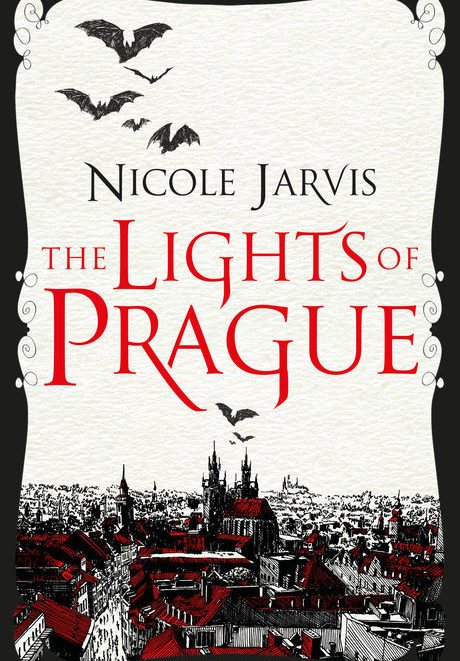
The Lights of Prague
Nicole Jarvis
Penguin Random House, 2021
Review by Nikki H.
The Lights of Prague is a standalone historical fantasy written by Nicole Jarvis. This debut novel tells the story of Domek, a monster hunter known as a lamplighter, and Ora, a vampire known as a pijavica, as they discover a conspiracy amongst the pijavice that could unleash trouble for the daylight world.
Pijavica translates to leech; it’s said that after a pijavica is created, they return to terrorize their former families. Jarvis does an effective job of incorporating this aspect of the lore and seamlessly weaving in new information about the pijavice, making the lore interesting and refreshing to read. The conspiracy between the pijavice families is gripping; the pijavice plan to find a “cure,” a way to walk in the daylight and take over the city. If successful, all of humanity would be threatened. When Ora hears about this so-called cure, she returns to the pijavice that created her—despite not wanting to enter that world again—to find out if the rumours are true. As we follow her, we begin to question how the pijavice are going to execute their plan, and to what ends.
Ora is dealing with grief. Her personality comes across between jaded and gentle, but it’s clear she cares about those she loves—even if the way she shows it isn’t always the best way possible. We get sprinkles of information about Ora and her past throughout the story. “To most pijavice,” we learn, “devouring humans was akin to eating beef, but Ora did not agree with that sentiment. One did not have conversations over a meal with cattle. Or marry them.” Beautifully written lines like this give a glimpse into Ora’s past and the loss she’s endured—as well as how she’s different from other pijavice in the novel.
Accompanying Ora is Domek, the monster hunter. Domek makes frustrating decisions; after finding a strange and powerful creature, a sentient being called the will-o’-the-wisp, Domek chooses to capture it and keep it in a mysterious container. He feels that he can’t trust anyone with it just yet, fearing what they might do with its power. Despite Domek’s room being ransacked in search of the will-o’-the-wisp, he continues to carry the creature and use its power when convenient. It’s not clear how this moves the story forward until he finally hands the will-o’-the-wisp over to his leader, and learns more about the conspiracy among the pijavica.
Throughout the book, Domek is being stalked by the White Lady—a ghost who haunts the baroque halls of Prague Castle. Webber, a fellow lamplighter, tells Domek about the rumours surrounding The White Lady, including that “she shows up to warn people about death,” and suggests that “maybe she can only be seen by the person who is going to die.” The White Lady’s appearances make the reader question why she’s there, what her relation is to the story, and why it seems Domek is the only one who can see her. Based on the rumours surrounding her, there’s an expectation that something could happen to Domek. However, he doesn’t question why she keeps showing up—nor does he consider the fact that maybe the rumours are true, and that he could die.
The descriptions of Prague are atmospheric and vivid; one striking section describes the orloj, “an ancient clock that tracked the sun, moon, months, and astronomical positions.” Prague as the setting for this story fits extremely well, and the city feels like another character in and of itself. One of the things that makes Prague distinct are the street lamps, referenced in the name of the monster hunters. Images of street lamps recur in descriptions of the city, and become characteristic of the story’s world. Scenes of the city’s nights feel thrilling, like anything could happen at any given time. In these descriptive moments, the simplicity and conciseness of the prose shines and makes the piece stronger.
Within the body of existing vampire literature, this novel provides a refreshing take on tradition, and though we’re used to the typical blood-sucking, aristocratic vampire, the pijavice in this novel feel unique enough to be considered their own type of vampire beyond just their name. I’m interested in what Nicole Jarvis will write next—hopefully, it will be just as atmospheric and vivid as The Lights of Prague.
Nikki H. enjoys the speculative side of fiction and is an avid Candy Crush player. She studied English Literature and Creative Writing in university, and her first book review was published in 2019 with PRISM International. During her free time she reads webcomics, watches culinary competitions on the Food Network, and is trying (keyword here) to return to her French studies while contemplating learning another language.